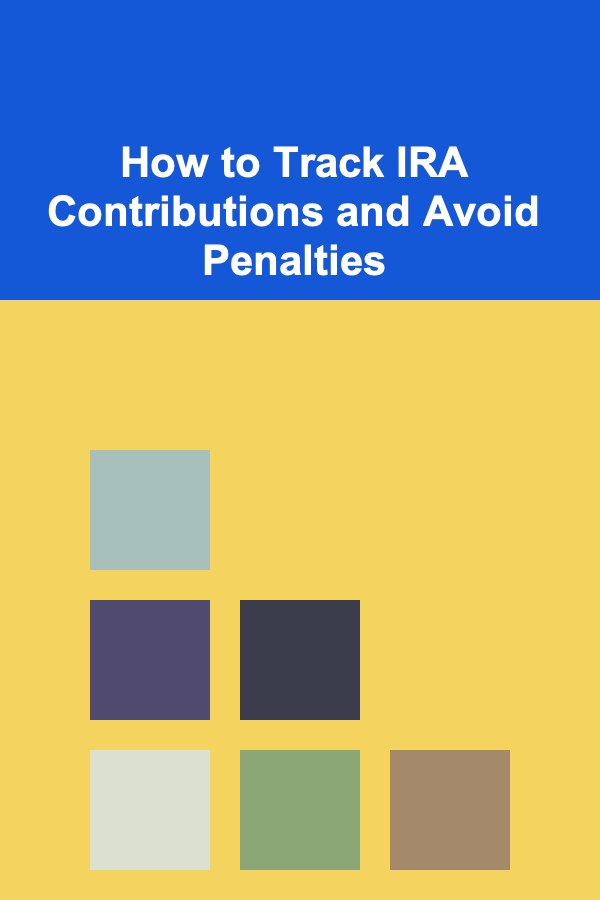
How to Prepare a Tax Checklist for Expats Living Abroad
ebook include PDF & Audio bundle (Micro Guide)
$12.99$11.99
Limited Time Offer! Order within the next:

Living abroad as an expatriate offers a wealth of opportunities and experiences. Whether you're working, studying, or retiring overseas, living in a foreign country comes with its own set of benefits and challenges. One of the most complex and sometimes daunting aspects of expat life is navigating the world of taxes. Depending on where you live, your income, and your citizenship, you may have tax obligations in multiple countries. Preparing a tax checklist is a crucial step in ensuring that you remain compliant with tax laws and avoid potential pitfalls.
In this comprehensive guide, we'll break down everything you need to know about preparing a tax checklist for expats living abroad. From understanding your obligations to gathering the necessary documents, this checklist will help simplify the process.
Understand Your Tax Obligations as an Expat
The first step in preparing a tax checklist is understanding your tax obligations. As an expat, your tax responsibilities will vary depending on your citizenship, the country where you live, and whether there is a tax treaty between your home country and your host country.
US Citizens Abroad
For example, if you're a US citizen living abroad, you are required to file a tax return with the Internal Revenue Service (IRS) regardless of where you live. The United States operates on a citizenship-based taxation system, meaning that even if you're living outside the country, you still must report your worldwide income.
However, you may be eligible for certain deductions and credits to avoid double taxation, such as:
- Foreign Earned Income Exclusion (FEIE): This allows you to exclude a certain amount of your foreign income from US taxation.
- Foreign Tax Credit (FTC): This credit allows you to offset taxes paid to your host country against your US tax liability.
Citizens of Other Countries
Citizens of other countries, such as the UK or Canada, may also have to file taxes in their home country even while living abroad, although each country's tax rules vary. In some cases, you may not have to file taxes if your income falls below a certain threshold or if your home country has a tax treaty with the country you're living in.
Before creating your checklist, it's crucial to understand whether your home country has a citizenship-based or residence-based taxation system.
Keep Track of Your Income Sources
As an expat, it's important to accurately track all sources of income, both from your home country and abroad. This includes wages, self-employment income, rental income, dividends, interest, and any other sources of income.
What to Track:
- Employment Income: If you're working for a company in your host country, keep track of your salary and any related benefits. Many countries have tax treaties with the US, which can affect how much tax you pay on foreign wages.
- Self-Employment Income: If you run your own business or are self-employed, you'll need to report your income and expenses. Keep detailed records of your earnings, business expenses, and any local taxes paid.
- Investment Income: Interest, dividends, and capital gains are typically taxable in most countries. Track all investments, including those held in foreign accounts.
- Foreign Income: If you're working or earning money in a different currency, make sure to convert it accurately to your home country's currency using the correct exchange rates. Some tax authorities require income to be reported in local currency.
By keeping an organized record of all your income sources, you'll be better equipped to calculate your tax liabilities and claim eligible deductions or exclusions.
Determine Residency Status
Residency status plays a key role in determining how much tax you owe as an expat. Many countries, including the US, have specific rules about what constitutes "residency" for tax purposes. Depending on whether you're considered a resident or non-resident for tax purposes, your tax obligations may differ significantly.
Common Residency Tests:
- Physical Presence Test: This is commonly used by the US to determine whether an individual qualifies for the Foreign Earned Income Exclusion. To meet this test, you generally need to be physically present in a foreign country for at least 330 days during a 12-month period.
- Substantial Presence Test: This test is another method of determining tax residency in the US. It is based on the number of days you have spent in the country during the current year and the previous two years.
- Tax Treaty Residency Rules: Some tax treaties contain specific residency rules that may affect your tax status. For instance, if you're a resident of two countries, you may need to determine which country has the right to tax you, often using tie-breaker rules outlined in the treaty.
In addition to understanding your tax residency status in your host country, be sure to check for any double taxation agreements (DTAs) between your home and host countries that may impact your tax obligations.
Collect Relevant Tax Documents
A key part of preparing your tax checklist is gathering all the necessary documentation. In most countries, tax authorities require proof of income, deductions, and taxes paid. Make sure you have all the documents you need for accurate tax filing.
Key Documents to Gather:
- W-2 or 1099 Forms (for US expats): These are official forms that report wages and other compensation from your employer in the US. Even if you're working abroad, your employer may still need to provide these forms.
- Foreign Income Documents: Collect documents related to your foreign earnings, such as pay stubs or salary certificates. For self-employed expats, this could include invoices, receipts, and other evidence of business income.
- Foreign Tax Returns: If you've filed taxes in your host country, keep a copy of your local tax return. This may be required to claim the Foreign Tax Credit or to establish that you have already paid taxes on your income in the host country.
- Bank Statements and Investment Records: Make sure to collect any documentation for foreign bank accounts or investments, including interest earned, dividends, and capital gains.
- Receipts for Deductible Expenses: Certain expenses, like business expenses for self-employed individuals or healthcare costs, may be deductible. Keep detailed records and receipts for these items.
By gathering these documents early, you can avoid scrambling at the last minute when it's time to file your taxes.
Check for Tax Credits and Deductions
As an expat, there may be a variety of tax credits and deductions available to reduce your overall tax liability. Research the tax benefits available in both your home country and your host country.
Common Expat Tax Benefits:
- Foreign Earned Income Exclusion (FEIE): This allows US expats to exclude a portion of their foreign-earned income from US taxation.
- Foreign Tax Credit (FTC): If you've paid foreign taxes, you may be eligible to claim the FTC to reduce your US tax liability.
- Child Tax Credits: Many countries offer child tax credits for dependents, which could lower your tax burden.
- Housing Exclusion: In some cases, US expats can exclude a portion of their housing expenses from taxable income, if they meet specific requirements.
- Education Credits: Some countries provide tax credits or deductions for education-related expenses, which may be available to expats studying abroad.
Check both countries' tax codes to ensure you're taking advantage of any credits or deductions that could reduce your tax bill.
Ensure Compliance with Local Tax Laws
Each country has its own tax laws, and it's important to comply with the tax regulations of your host country. This means staying on top of deadlines, paying taxes on time, and ensuring that you're filing all required forms.
Host Country Tax Compliance Tips:
- Understand Local Tax Rates: Tax rates can vary widely between countries. Understand the tax brackets in your host country and how they apply to your income.
- File Local Tax Returns: Many countries require expats to file a tax return. Be sure to file your local tax return on time to avoid penalties.
- Understand VAT/Sales Tax: Some countries have Value-Added Tax (VAT) or sales tax systems, which may apply to certain goods and services. Ensure you're aware of these taxes and include them in your budgeting and expense reporting.
By ensuring you comply with local tax laws, you can avoid legal trouble and financial penalties.
Work with a Tax Professional
Navigating taxes as an expat can be complicated. If you're unsure about any aspect of your tax situation, it's wise to consult with a tax professional who specializes in international tax law. They can help you understand your obligations, identify potential deductions or credits, and ensure that you file your taxes correctly in both your home and host countries.
Choosing a Tax Professional:
- Expertise in Expat Taxation: Look for professionals who are familiar with expat tax law and have experience dealing with cross-border tax issues.
- Tax Treaties: Make sure the tax professional understands any tax treaties that may apply to your situation.
- Fee Structure: Be clear on how your tax advisor charges (flat fee, hourly rate, etc.) and make sure their services fit within your budget.
Working with a qualified tax professional can save you time, money, and stress, and help you navigate the complexities of international taxation.
File Your Taxes on Time
Filing taxes on time is critical to avoid penalties and interest. While the deadlines for tax filing can vary by country, most tax authorities allow expats to file extensions if necessary.
Filing Tips:
- Know Your Deadlines: Be aware of the deadlines for both your home country and your host country. The US, for example, allows an automatic extension for expats to file until June 15th, with the possibility of additional extensions.
- Consider e-Filing: Many countries allow e-filing of tax returns, which can simplify the process and ensure that your return is filed on time.
Plan for Future Tax Years
Once you've filed your taxes, take the opportunity to start planning for future years. Review your current financial situation, track any changes in your income or tax obligations, and adjust your checklist accordingly.
Long-Term Tax Planning:
- Retirement Accounts: Consider how your foreign income affects contributions to retirement accounts, such as IRAs or 401(k)s in the US.
- Future Moves: If you plan to move to a different country or return to your home country, start researching the tax implications of your relocation.
By planning ahead, you can better manage your finances and avoid surprises at tax time.
Conclusion
Preparing a tax checklist for expats living abroad is essential for ensuring compliance with tax laws and minimizing tax liabilities. By understanding your obligations, tracking your income, gathering necessary documents, and utilizing available credits and deductions, you can successfully navigate the complex world of expat taxation. Whether you choose to file your taxes independently or work with a tax professional, staying organized and informed will help you avoid unnecessary stress and ensure that your expat experience is as seamless as possible.
Reading More From Our Other Websites
- [Personal Care Tips 101] How to Choose a Conditioner That Nourishes Dry Hair
- [Survival Kit 101] Best Fire Starter for Survival Kit: Why You Need One for Your Emergency Pack
- [Personal Finance Management 101] How to Negotiate Your Salary for Maximum Earning Potential
- [Home Pet Care 101] How to Identify & Address Common Cat Health Problems at Home: An Early Detection Guide
- [Digital Decluttering Tip 101] From Chaos to Control: How to Build a Scalable Folder Structure for Teams
- [Personal Investment 101] How to Take Advantage of Tax-Advantaged Investment Accounts
- [Mindful Eating Tip 101] Best Ways to Integrate Mindful Eating Into a Plant‑Based Vegan Diet
- [Personal Care Tips 101] How to Switch Mascara Brands for Healthier Lashes
- [Home Soundproofing 101] How to Soundproof Your Apartment When You're Renting
- [Home Maintenance 101] How to Prevent and Repair Drywall Cracks in Your Home

How to Prioritize Home Repairs and Upgrades
Read More
How to Stage Your Home's Walls to Add Character Without Overdoing It
Read More
How to Stage Your Home to Maximize Storage and Organization
Read More
How to Transform Unused Spaces into Functional Areas
Read More
How to Invest in Bonds (and Their Relation to Stocks)
Read More
How to Track IRA Contributions and Avoid Penalties
Read MoreOther Products

How to Prioritize Home Repairs and Upgrades
Read More
How to Stage Your Home's Walls to Add Character Without Overdoing It
Read More
How to Stage Your Home to Maximize Storage and Organization
Read More
How to Transform Unused Spaces into Functional Areas
Read More
How to Invest in Bonds (and Their Relation to Stocks)
Read More